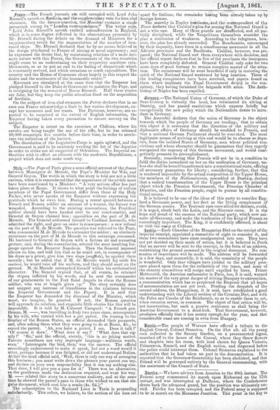Sfak—The Pays of Paris gives a semi-official account of the
fracas between Monsignor de Merode, the Pope's Minister for War, and General Goyon. The words in which the story is told are not a little curious, when it is remembered that the appearance of the article must have been sanctioned by a Minister: "A. very serious affair has just taken place at Rome. It shows to what point the feelings of certain members of the Papal Government differ from those of the Holy Father, who never speaks of the Emperor without expressing the gratitude which he owes him. During a recent quarrel between a French and Roman soldier on account of a woman, the former was wounded. According to the existing conventions, the Pontifical soldier should have been handed over to our court-martial, and General de Given claimed him : opposition on the part of M. de Merode. The General addressed himself to Cardinal Antonelli, who admitted the right, and gave an order in consequence : a new refusal on the part of M. de Merode. The question was referred to the Pope, who commanded M. de Merode to surrender the soldier : an obstinate resistance on the part of M. de Merode to this sovereign command. He hastened to General de Goyon with a furious air and menacing gesture, and, during the conversation, uttered the most insulting lan- guage against the Emperor Napoleon. Then the General imposed silence on him, and told him that as he could not, in consequence of his dress as'a priest, give him two slaps (saujlets), he applied them morally ; but he added that if M. de Itlerode would lay aside his soutane, he would take off his uniform, and they should meet on the ground. M. de Merode entrenched himself within his ecclesiastical Character. The General replied that, at all events, he retained the stigma inflicted by his words, and he sent the commander of our gendarmerie to the Fort Saint Angelo to claim the Roman soldier, who was at length given up." The story certainly does not suggest any increase of friendliness in the relations between the Imperial Government and the Papacy. It is said that the Emperor has demanded the dismissal of the Minister, which must, we imagine, be granted. If not, the Roman question will approach its solution, and exquisite little stories like this will be impossible. It is told by M. Clement Caraguel: "A French gen- tleman, M. —, was travelling in Italy two years since, accompanied hy his wife, who carried with her a pet parrot. On coming to the frontier of the Roman States, an official demanded their passports, and, after asking them what they were going to do at Rome, bkc., he espied the parrot. 'Ahi, you have a parrot, I see. Does it talk ?' 'Of course it does!, What does it say?' ' What does that sig- nify?' ' Sir,' said the official, sternly, this is no joking matter. Parrots sometimes use very improper language—seditious words, even.' 'Interrogate the bird, then,' was the answer. The official accordingly endeavoured to make it speak, but not a word would it utter, perhaps because it was fatigued, or did not understand Italian. At last the head official said, 'Well, there is only one way of arranging this business ; you must write down the phrases your parrot can say, and declare on your own responsibility that it can say nothing else. That done, I will give you a pass for it.' There was no alternative, so the gentleman made the declaration required, and went his way. M. — related this story to a numerous auditory, and at the same tune he showed the parrot's pass to those who wished to see that sin- gular document, which cost him a scudo (4s. 6d.)." The subscription to the National Loan in Turin is proceeding flatisfactonly. This refers, we believe, to the section of the loan set
apart for Italians, the remainder haying been already taken up by foreign houses.
The anarchy in Naples continues,, and the correspondent of the Times declares that Cialdini'a plan.for arming the National Guard is not a wise one. Many of these guards are disaffected, and all par- tially disciplined, while the Neapolitans themselves consider the plan a confession of weakness. According to the telegrams, how- ever, the plan has already succeeded. The Bourbonists, encouraged by their impunity, have risen in a simultaneous movement in all the Adriatic provinces and the Basilicata. Cialdini, however, was pre- pared; the National Guard met them everywhere with decision, and the official report declares that in five of the provinces the insurgents have been completely defeated. General Cialdini only asks for two more days of good fortune to remain complete master of the situa- tion. The occurrence will be most beneficial if only in restoring the spirit of the National Guard weakened by long inaction. Three of the leading conspirators have been arrested, and papers found on them which implicate the Papal Government deeply in the con- s-piracy, they having furnished the brigands with arms. The Arch- bishop of Naples has been expelled.






























 Previous page
Previous page